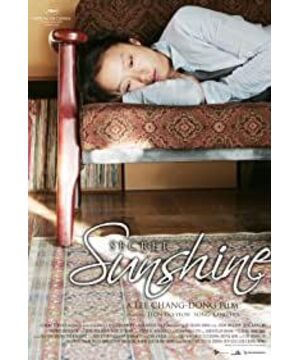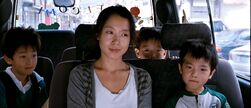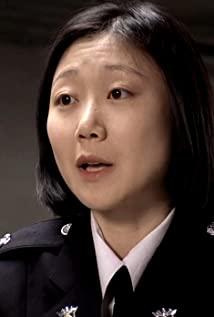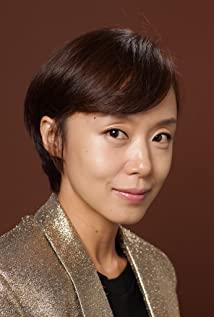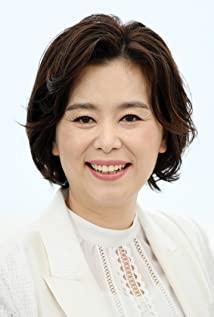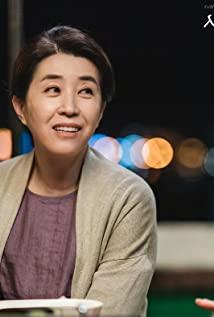In recent years, the Christian color of Korean film and television has gradually become stronger, and "sin" and "love" have become the two most distinct themes. For example, "The Scarlet Letter" cites the story of Eve to describe the sinking of sin; the love and forgiveness in "Da Jang Geum", as well as the sense of mission in life, are also clearly separated from the Confucian atmosphere, which is similar to the Danish business card "Babette's". "The Feast" has a comparison; Kim Ki-deok's "The Girl of Samaria" uses Jesus' famous parable of "The Good Samaritan" to set off a prostitute's life struggle. But it wasn't until Lee Chang-dong's Miryang that mainstream Korean cinema began to encounter Christianity in a poignant way.
Shin Ae's hopelessness, bitterness, and loss make life fall into another abyss that is unbearable. Until I accidentally walked into a church and cried a lot in the midst of believers and hymns. As soon as the camera turned, Shin Ae smiled for the first time in the movie. She went from thinking of a Christian, "You are so pitiful", to saying happily, I now believe that "in every ray of sunshine, there is the will of the Lord". One day on the road, she saw the murderer's daughter being beaten on a street corner. She hesitated for a moment and drove away. When Shin-ae returned home and recited the Lord's Prayer, "Forgive us our debts, as we forgive our debts," she was so moved that she decided to visit the prison to tell the murderer that God's love made her forgive him.
At this point, the film turns abruptly, and across the glass wall, the murderer calmly said, "Thank God, he has forgiven my sins, and I have become a Christian." Shin-ae froze and fainted in the sun as soon as she got out of prison. The resentment of her life was only aroused deeper. Her question about life is no longer "Why do I encounter these pains", but "I haven't forgiven him, why should God forgive him"?
The heroine Jeon Do-yeon, who plays Shin Ae, has won the only international actress for a Korean film in the past 20 years with two life scenarios of peace and joy and hysteria. The object of Shin Ae's resentment turned from suffering to faith. She screamed deliberately in church, she replaced crusade hymns with "all fake" pop music, she seduced pastors, she threw stones at the homes of believers who had gathered late at night to pray for her until she cut her wrists and committed suicide. Is the film questioning the secularization of the Korean church, accusing the "cheap gospel" of not bringing true salvation to many Christians? In the last shot, Shen Ae returns home from a mental hospital and cuts her hair in the house. The camera freezes on a corner beside her feet, a dilapidated but sunny corner. I remember when the pastor's wife preached the gospel to her in the store, saying that every ray of sunshine has God's love. Shen Ai ran to a brightly lit corner, turned her head and asked, so what is here.
The last shot continues this question, the scriptures say, "The sun shines on the good people, but also on the bad people". So what about a shabby corner, even if it is illuminated by the sun. For Shin Ae at this time, what if the sun rises as usual tomorrow. I just happened to see an interview with Li Changdong in the magazine, titled "I don't believe in happiness".
Regarding forgiveness, there have been two similar famous stories in the religious revival of South Korea in the past half century, which constitute an era background for the questioning and exploration of this film. One example was the murder of a wealthy Korean widow, her only son, in the 60s. After struggling, she went to the court to ask for the murderer to be released, and expressed her willingness to accept him as her son. She also wrote a letter begging the president for pardon, and finally the murderer was pardoned, which shocked Korean society for a while. At the time, US President Johnson also wrote to the lady, calling her the greatest woman in the world. Another example was in the early 90s. In order to sabotage the Seoul Olympics, North Korean female agent Kim Hyun-hee was ordered to blow up Korean Air Flight 858 on November 28, 1987. All 115 people on board were killed. Kim Hyun-hee confessed her guilt in prison. After being sentenced to death, the priest in prison brought her to the Lord and baptized her. In April 1990, President Roh Tae-woo delivered a nationally televised speech announcing the amnesty of the 26-year-old female terrorist.
Without this string of forgiveness and reconciliation, there would be no Korean society today. What the director wants to question is not these true witnesses that have updated Korean history; it is the repentance of a sinner and the forgiveness of a victim, is it really that easy? It is often heard that the Bible teaches that people can be saved if they have faith, which is too easy. But a letter is easier said than done, otherwise you come and try. Shen Ai's story shows the difficulty of redemption, so difficult that no human effort can do anything.
Lin Yutang once said in his autobiography that there are three types of Christians. One is remorse for sin and desires to be free from the reproach of conscience. One that needs comfort and escape because of pain. There is another, they know what they believe, and then sincerely trust in the one they believe. Mr. Lin said that the first two can be the beginning of faith, but neither is true faith.
In this movie, the murderer who has no remorse for his victims is the first. Jesus said that the Holy Spirit has come to cause the world to "reprove itself for sin, for righteousness, and for judgment." There is no peace without true repentance, not true peace, but only a massage of the spirit and a sauna of the soul. And Shin Ae seems to be the second type. She uses forgiveness as a platform to overcome suffering in front of the forgiven. Therefore, when the other party says that he also believes in God, it shatters her self-righteousness and makes her fall from a forgiveness to a valley of resentment.
For in the same way, forgiveness without true repentance is not forgiveness, but arrogance from the top. Jesus told a parable about a man who owed 10,000,000 taels, and the master forgave him. When he went out, he met a companion who owed him ten taels of silver, but he cruelly put him in prison. The so-called forgiveness is to admit that the 10,000,000 taels owed by oneself have been forgiven, so they are willing to forgive the 10 taels that others owe. The so-called forgiveness is seeing the grace of God and voluntarily giving up the right to deal with the wrong party. The so-called forgiveness is to rely on the support of faith to overcome the situation and choose not to live in the past. So every day can be the beginning of a new life, and every ray of sunshine can be interesting.
Remember last year in a couples group, there were three questions, number one, who taught you the most about forgiveness as a kid? Second, when you were a child, you most remember the experience of saying "I was wrong." Third, in real life, who is your example of forgiveness? Unfortunately, my answer is no. Aside from "a knife on the end of the word forbearance", I grew up knowing nothing about true forgiveness.
Dostoevsky said that it was never the suffering that made me suffer, but whether I was worthy of it. If I meet a Shen Ai, I won't say, come, follow me in a prayer, and you will be saved. I would say that praise is always in the valley of the shadow of death, and faith is always in a lonely wilderness.
View more about Secret Sunshine reviews


